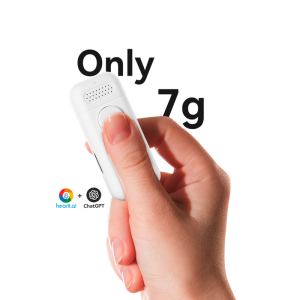As globalization accelerates, more people are traveling, working, or studying abroad. One of the primary challenges faced by individuals in foreign countries is language barriers. Traditional language learning methods, while effective, require significant time and effort. With the rapid development of artificial intelligence (AI) technology, AI translators have emerged as effective tools to overcome language barriers. This article explores the application of AI translators in international travel and their impact on travelers, international students, and multinational businesses.

The Basics of AI Translators
AI translators use deep learning and neural network technology to analyze vast amounts of language data, enabling efficient and accurate language translation. Compared to traditional translation tools, AI translators possess a stronger understanding of context, allowing them to handle complex sentence structures and cultural nuances. Recent advancements in AI, such as Google Translate and Microsoft Translator, continuously optimize algorithms to improve translation quality, making them essential tools for people traveling abroad.
Application in International Travel
Language Communication
When traveling abroad, language barriers can present significant inconveniences for tourists. AI translators can provide real-time translation of conversations between tourists and locals, helping travelers overcome language barriers. For instance, when ordering food in a restaurant, asking for directions, or shopping, AI translators can quickly and accurately convey the tourist’s needs to locals, greatly facilitating the travel experience.

Cultural Exchange
Cultural exchange is a vital aspect of travel, and language is the bridge of cultural exchange. AI translators can translate languages and provide cultural background knowledge, helping tourists better understand local cultures. For example, when visiting historical sites or museums, AI translators can offer detailed explanations and background information, allowing tourists to gain deeper insights into local culture.
Application for International Students
Learning and Daily Life
For international students, language is an essential tool in both learning and daily life. AI translators can help students overcome language barriers and improve learning efficiency. For example, in the classroom, students can use AI translators to translate the teacher’s explanations in real-time, ensuring they understand the course content. In daily life, AI translators can assist students with various tasks, such as handling banking, renting apartments, etc.
Social Integration
Language barriers often affect international students’ social interactions and adaptation processes. AI translators can help students communicate more smoothly with classmates, roommates, and locals, enhancing social interactions and promoting cultural adaptation. For instance, students can use AI translators to discuss topics with classmates or communicate daily details with roommates, helping them integrate into the new environment more quickly.
Application in Multinational Businesses
Business Communication
In multinational businesses, employees from different countries and regions need to communicate and collaborate frequently. AI translators can enhance business communication efficiency and reduce the difficulties caused by language barriers. For example, during international meetings, conference calls, or email exchanges, AI translators can provide accurate translations to ensure clear understanding among all parties, facilitating smooth business operations.
Document Translation
Multinational businesses need to handle a large number of multilingual documents, such as contracts, technical materials, market reports, etc. AI translators can quickly and efficiently translate these documents, reducing the time and cost of manual translation. For instance, when a business needs to translate an English contract into multiple languages, AI translators can complete the translation in a short time, ensuring that teams in different countries can promptly access and understand the document content.
Advantages of AI Translators
Real-time and Convenience
AI translators provide real-time translation capabilities, allowing users to input speech or text and quickly receive translated results. This real-time and convenience aspect significantly facilitates communication and interaction for people traveling abroad. In emergency situations, AI translators can provide swift assistance.
Efficiency and Accuracy
Modern AI translators utilize advanced deep learning algorithms to efficiently process vast amounts of language data, offering high-quality translation results. Compared to traditional translation tools, AI translators have a stronger understanding of context, can handle complex sentence structures, and better manage cultural nuances, improving translation accuracy.
Multilingual Support
AI translators typically support multiple languages, meeting the needs of diverse users. For example, Google Translate supports over 100 languages, allowing users to choose the appropriate language for translation. This multilingual support makes AI translators widely applicable on a global scale.
Future Development and Challenges
Technological Advancements
With the continuous advancement of AI technology, the quality and functionality of AI translators will further improve. Future AI translators may focus more on natural speech recognition and generation, enhancing user experience. Additionally, combining augmented reality (AR) and virtual reality (VR) technologies could provide a more immersive translation experience.
Privacy and Security
Using AI translators involves uploading user speech and text data to servers for processing, raising concerns about privacy and data security. Future AI translators need to ensure translation quality while adopting effective measures to protect user privacy and data security. For example, employing end-to-end encryption can ensure data security during transmission.
Cultural Understanding
Although AI translators have made significant progress in language translation, challenges remain in cultural understanding. Language is not only a tool for information transmission but also carries rich cultural connotations. Future AI translators need to pay more attention to understanding and translating cultural backgrounds, providing more culturally sensitive translation results.
AI translators, as advanced language translation tools, have broad application prospects in international travel, international student learning, and multinational business communication. They not only provide real-time, accurate language translation but also offer cultural background knowledge, helping users better understand and adapt to foreign environments. As technology continues to advance, the functionality and performance of AI translators will further improve, offering more efficient solutions for language communication in the globalization process.





Leave a Reply
You must be logged in to post a comment.